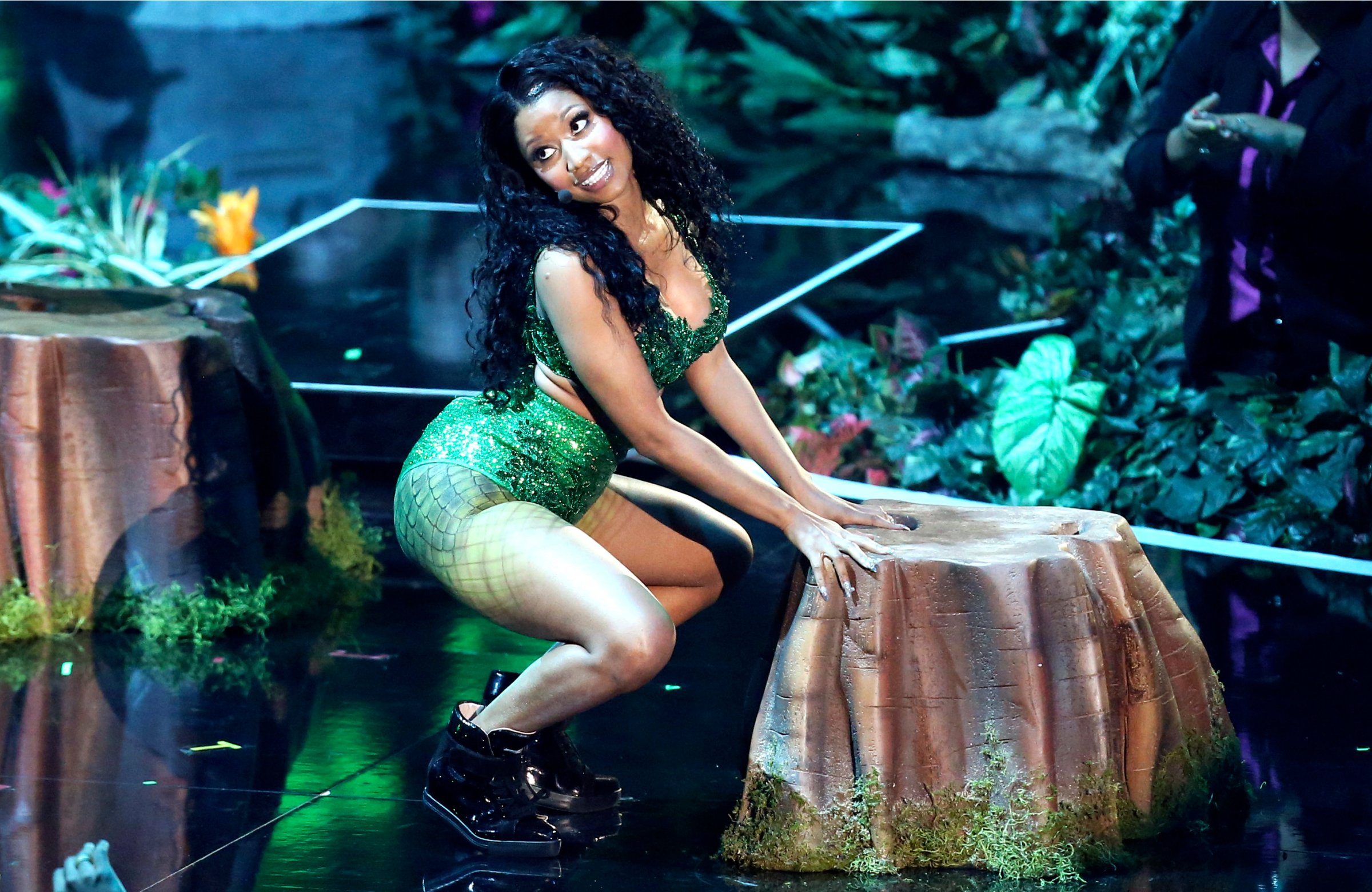
Pop quiz: What’s the most important scene in Nicki Minaj’s colorful, not-safe-for-work “Anaconda” video? Is it when she gives an overwhelmed Drake an enthusiastic lapdance and slaps his hand away at the last minute, just as he reaches for her body? Or is it when she suggestively brings a banana to her mouth before deciding instead to mince it, slicing it with a knife and chucking it like a piece of trash? Both would be acceptable answers, and they share the same message: You may enjoy what I do, but make no mistake — this isn’t for you.
Minaj is not the first artist to write a song about her butt, nor will she be the last, nor is this even the first time she’s tried to flip the male gaze on its head through a bait-and-switch. (See the stark and violent clip for “Lookin Ass,” a song which makes this point clearly, even if its profanity-heavy lyrics can’t justly be quoted here.) But Minaj’s message seemed quite prescient considering what happened less than two weeks after “Anaconda” premiered: hackers stole a bunch of nude photos from a number of female celebrities and posted them on the Internet.
As others have pointed out, the incident isn’t a “scandal” for stars to be ashamed of, but a crime — and while it may not be sexual assault, it’s certainly meant as a kind of attack. Writing for The Guardian, author Roxane Gay said the theft “is meant to remind women of their place … Don’t step out of line. Don’t do anything to upset or disappoint men who feel entitled to your time, bodies, affection or attention. Your bared body can always be used as a weapon against you.” Stolen photos of private moments like these are meant to shame, which is exactly why I’ve started to see “Anaconda” as not just an supply of endlessly amusing GIFs from one of rap’s most entertaining and talented emcees, but also as an act of self-defense — a pre-emptive strike when it comes to defining the relationship between your body and the public.
Our celebrity culture’s history of sex tapes and “leaked” photos aside, Minaj still had numerous reasons to make a video like this — just look at the past year in pop music. Plenty of ink has been spilled over the racial implications of Miley Cyrus using black female dancers to pull off her hip-hop sexpot makeover. Katy Perry’s mummified dancers looked like racist caricatures. Lily Allen claimed race wasn’t a factor in casting dancers for her controversial “Hard Out Here” video, but race certainly becomes an issue when she sang, “Don’t need to shake my ass for you ‘cause I’ve got a brain” before the camera later cut to a black dancer doing just that. It’s as if Allen wanted to tell you she’s not like those girls, much like the message Taylor Swift sends when she, decked out bling with an exaggerated look of bewilderment on her face, crawls out from underneath a line of twerking of butts in her “Shake It Off” video.
Women of color evidently don’t often get a lot of say in how they appear or what they’re supposed to symbolize in pop culture, so Minaj’s ladies-first Amazonian jungle paradise is significant simply for the fact that it exists. But a market for stolen nudes exists, too, and Minaj might as well continue inoculating herself against it and other exploitive forces by owning her sexuality through her preferred visual medium. Scandals don’t exist in a vacuum; scandals are created when celebrity’s public image is drastically at odds with whatever they’ve been caught doing. That image is shaped in part by the art they make, which is why Jennifer Lawrence (one of the women whose photos were stolen) and her career may not suffer for what’s been shared. “The photos of Lawrence are explicit and nude and NSFW, but there’s nothing to suggest anything darker than the sexual appetites of her characters in Silver Linings Playbook and American Hustle,” writes Anne Helen Petersen at BuzzFeed. Swap films roles for single covers and music videos, and the same can be true for pop stars.
There’s sort of a basic PR lesson behind showing a lot of skin: the more of yourself you expose, the harder it is for someone to in turn expose you. The more you try and keep a lid on your personal life, the more dramatic and shocking a privacy violation can seem to outside observers. (Just think of all the Instagrams someone like Rihanna or Miley Cyrus have posted that would make headlines if they came from Beyoncé’s squeaky-clean account.)
But “Anaconda” isn’t about avoiding big controversies by hiding among smaller, lesser “offenses” — it’s about recognizing that your image is your weapon as much as anybody else’s, and you can use it or lose it. Look how often successful women’s bodies have been used to knock them down a peg while perpetrators see dollar signs; look how often pop stars use other women’s bodies, sometimes removed from the head and human they’re apart of, to make a point or define themselves against another artist. If Nicki Minaj doesn’t go out of her way to control who sees what and on what terms, someone else is going to. Why shouldn’t she be the one to profit?
More Must-Reads from TIME
- Introducing the 2024 TIME100 Next
- The Reinvention of J.D. Vance
- How to Survive Election Season Without Losing Your Mind
- Welcome to the Golden Age of Scams
- Did the Pandemic Break Our Brains?
- The Many Lives of Jack Antonoff
- 33 True Crime Documentaries That Shaped the Genre
- Why Gut Health Issues Are More Common in Women
Write to Nolan Feeney at nolan.feeney@time.com